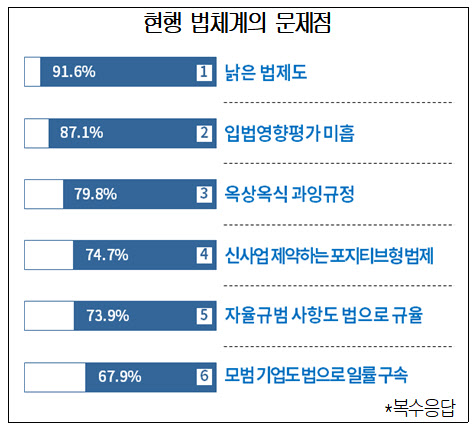The Korea Chamber of Commerce and Industry announced on the 15th that as a result of a survey of 1,200 adults in their 20s and 50s,’public perception of the 21st National Assembly legislative direction’, 91.6% cited the’old legal system’ as a problem of the current legal system.
The response that the legal system is’out of date’ was the highest at 94.8% in the youth generation (20s), followed by their 30s (91.8%), 50s (90.7%), and 40s (89.1%).
|
In fact, in the workplace, innovation is often blocked by outdated legislation, but the legislation of related support legislation is seldom speeding up. The’Top 10 Prompt Legislative Tasks for Innovation Support’ selected by the business community are still pending in the National Assembly or have not even been initiated. The’Service Industry Development Basic Act’ has been pending by the National Assembly for 10 years, and the’Sandbox 3 Act’ (Industrial Convergence Promotion Act, Information and Communication Convergence Act, Financial Innovation Special Act) is still legislated even though the period of special exception for regulatory sandbox demonstration (2 years) has expired. Whether it is unclear. In the medical field, the Personal Information Protection Act, which allows my data business, and the Occupational Safety and Health Act, which allow remote safety inspection using virtual reality (VR) and augmented reality (AR), have not been proposed.
Professor Tae-yoon Kim of Hanyang University (advisory committee member of the Korean Chamber of Commerce) said, “Amid the transition to a low-growth trend, even the corona 19 has been prolonged and the overall vitality of the national economy has declined.” Said.
When asked about the legislative method for solving economic and social problems, more respondents answered’Compensation for the shortcomings after strict enforcement of the existing system’ (60.6%) than’the establishment of the system’ (39.4%). In the case of the establishment of a new system, a majority of respondents answered that “we must boldly legislate” (14.0%), rather than “review overseas cases and come up with alternatives with less side effects” (86.0%).
Even in the questionnaire asking whether to maintain or ease the regulation, respondents answered that’the autonomy of model companies should be expanded’ (55.6%) and’the level of regulation should be relaxed to the level of advanced countries’ (32.0%). The response containing the weight was superior to the response that “keep it current” (12.4%).
The top priority legislative task of the 21st National Assembly was’improving economic vitality’ (39.8%). These results are the same as the results of a survey conducted by the Korean Chamber of Commerce on young adults in their twenties in December last year, and are attributed to the great concern that economic vitality declines due to the prolonged corona 19 situation. This was followed by’improving the rights and interests of workers and consumers’ (28.5%),’improving corporate governance and commerce practices’ (15.6%), and’improving the welfare of the underprivileged’ (14.3%).
Lee Sang-heon, head of the Regulatory Innovation Team of the Korean Sang-Heon, said, “The people are hoping that the National Assembly will carry out legislative activities with the highest priority on reforming the legal system reflecting the changes of the times and promoting economic vitality.” We look forward to this first.
|


